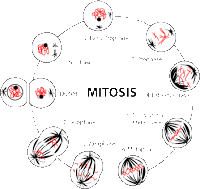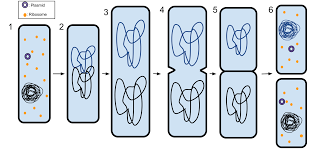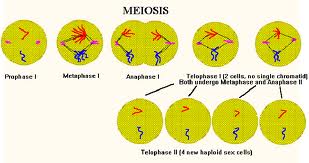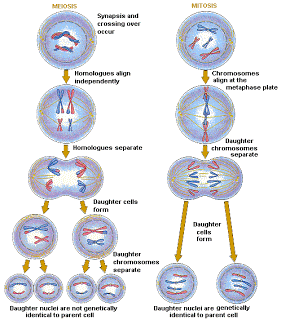Biology
- Prokaryotes Vs Eukaryotes
While eukaryotic cells and prokaryotic cells have some characteristics in common, they diverged from their common ancestor billions of years ago, thus accounting for significant differences in overall structure and function. Here we will go over them....
- The Cell Cycle
What are all of the stages to the Cell Cycle? The Cell Cycle starts with its first stage called Interphase. The cell will be in this stage the longest amount of time out of all of the stages of the cycle. During the first part of Interphase is called...
- # 30 Mitosis
Mitosis is a nuclear division giving rise to genetically identical cells in which the chromosome number is maintained by the exact duplication of chromosome. Significance of mitosis production of geneticlly identical cells: It keeps the chromosome...
- # 28.2 The Mitotic Cell Cycle - Syllabus 2016
5.1 Replication and division of nuclei and cells 5.2 Chromosome behaviour in mitosis When body cells reach a certain size they divide into two. Nuclear division occurs first, followed by division of the cytoplasm. The mitotic...
- # 28.1 The Mitotic Cell Cycle - Syllabus 2015
? Replication and division of nuclei and cells ? Understanding of chromosome behaviour in mitosis Learning Outcomes Candidates should be able to: (a) explain the importance of mitosis in the production of genetically identical cells, growth, repair...
Biology
Mitosis VS ...
Mitosis can be compared to a couple of different cell actions. But what makes it different?
Mitosis is the process of which a cell divides and creates copies of itself, the main purpose of this being to help the organism grow or to replace cells that are either worn out, damaged, or simply old. Mitosis does not happen in certain types of cells because those cells do not create identical copies of themselves though different types of cell reproduction consists of prophase, metaphase, anaphase, and telophase. At the end of mitosis, there is an ending result of two cells that are exactly the same.
 Binary fission is a form of asexual reproduction. It can duplicate whole organisms as well as single cells in eukaryotic organisms. In the process of a single cell, two daughter cells are made by a single parent cell by cloning itself. The cell starts by creating copies of DNA and makes two complete sets. The cell then grows and the DNA move to opposite ends of the cell staying there until the cell is big enough to where it splits into two, introducing two daughter cells with identical DNA.
Binary fission is a form of asexual reproduction. It can duplicate whole organisms as well as single cells in eukaryotic organisms. In the process of a single cell, two daughter cells are made by a single parent cell by cloning itself. The cell starts by creating copies of DNA and makes two complete sets. The cell then grows and the DNA move to opposite ends of the cell staying there until the cell is big enough to where it splits into two, introducing two daughter cells with identical DNA.
 What makes mitosis and binary fission different from each other? They both sound like they are the same since they both make exact copies. Mitosis is more complicated then binary fission since it only takes about two to three steps to complete. Mitosis and binary fission both have the same possible side effects if the cell does not copy correctly. What makes them different is that binary fission is a form of asexual reproduction. It can duplicate a whole organism while mitosis can only make duplicates of cells.
What makes mitosis and binary fission different from each other? They both sound like they are the same since they both make exact copies. Mitosis is more complicated then binary fission since it only takes about two to three steps to complete. Mitosis and binary fission both have the same possible side effects if the cell does not copy correctly. What makes them different is that binary fission is a form of asexual reproduction. It can duplicate a whole organism while mitosis can only make duplicates of cells.


Meiosis is the process of which a cell divides and reproduces cells. Meiosis only happens in certain types of reproductive cells called gametes, in humans these are called eggs and sperm and in plants they are called spores. Unlike mitosis, DNA from each contributing cell mixes up and forms the X. At the end of meiosis, there is an ending result of four cells.
 Since meiosis and mitosis are very alike in that they both reproduce cells and use the same cycle, there are a few key differences between mitosis and meiosis. A big contributing factor to their differences is that mitosis ends with identical cells while meiosis ends with cells that are alike but not identical. Another difference is that meiosis only happens in certain types of cells and needs two cells in order to reproduce where mitosis only needs one single cell. One more difference would be that in mitosis the two parts of the X are identical where in meiosis the X is made up of different pieces of DNA from each cell.
Since meiosis and mitosis are very alike in that they both reproduce cells and use the same cycle, there are a few key differences between mitosis and meiosis. A big contributing factor to their differences is that mitosis ends with identical cells while meiosis ends with cells that are alike but not identical. Another difference is that meiosis only happens in certain types of cells and needs two cells in order to reproduce where mitosis only needs one single cell. One more difference would be that in mitosis the two parts of the X are identical where in meiosis the X is made up of different pieces of DNA from each cell.





Meiosis is the process of which a cell divides and reproduces cells. Meiosis only happens in certain types of reproductive cells called gametes, in humans these are called eggs and sperm and in plants they are called spores. Unlike mitosis, DNA from each contributing cell mixes up and forms the X. At the end of meiosis, there is an ending result of four cells.


- Prokaryotes Vs Eukaryotes
While eukaryotic cells and prokaryotic cells have some characteristics in common, they diverged from their common ancestor billions of years ago, thus accounting for significant differences in overall structure and function. Here we will go over them....
- The Cell Cycle
What are all of the stages to the Cell Cycle? The Cell Cycle starts with its first stage called Interphase. The cell will be in this stage the longest amount of time out of all of the stages of the cycle. During the first part of Interphase is called...
- # 30 Mitosis
Mitosis is a nuclear division giving rise to genetically identical cells in which the chromosome number is maintained by the exact duplication of chromosome. Significance of mitosis production of geneticlly identical cells: It keeps the chromosome...
- # 28.2 The Mitotic Cell Cycle - Syllabus 2016
5.1 Replication and division of nuclei and cells 5.2 Chromosome behaviour in mitosis When body cells reach a certain size they divide into two. Nuclear division occurs first, followed by division of the cytoplasm. The mitotic...
- # 28.1 The Mitotic Cell Cycle - Syllabus 2015
? Replication and division of nuclei and cells ? Understanding of chromosome behaviour in mitosis Learning Outcomes Candidates should be able to: (a) explain the importance of mitosis in the production of genetically identical cells, growth, repair...
